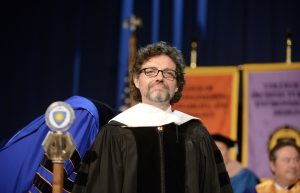Opinion: Nobel winner was a skeptic
November 17, 2013
Elaina Sauber
Elaina Sauber is a senior English major and columnist for the Daily Kent Stater. She can be reached at [email protected]
Doris Lessing, a groundbreaking novelist who won 2007’d Nobel Prize in Literature, died yesterday at the age of 94. Despite leaving school at 14, Lessing produced a multitude of creative writings during her lifetime, from novels and short stories to poetry. According to the New York Times, much of her work focused on “a childhood in the central African bush, the teachings of Eastern mystics and years of involvement with grass-roots Communist groups.” Lessing’s autobiography describes her life as a young wife and mother living in modern-day Zimbabwe before leaving married life and her children behind to pursue the freedom she desired as a self-proclaimed Communist revolutionary. She once said in an interview, “I couldn’t stand that life… it’s this business of giving all the time, day and night, trying to conform to something you hate.”
Writers don’t always disclose such personal details of their lives, but Lessing’s records of her own experiences made her a more powerful writer.
What made Lessing such a remarkable writer was, in fact, her skepticism. “The Golden Notebook,” her 1962 book that the New York Times called “daring in its day for its frank explorations of the inner lives of women” was seen as a feminist work, which frustrated her because she found it trivial in the grand scheme of things, saying in 1970, during the Vietnam War, “I’ve got the feeling that the sex war is not the most important war going on, nor is it the most vital problem in our lives.” In 1994, she remained cynical about the feminist movement. “Things have changed for white, middle-class women,” she said, “but nothing has changed outside this group.” Though she agreed with many facets of the feminist movement, she saw it as a symptom of a greater human-rights issue at hand rather than the main focus of inequity among populations. In spite of her cynicism, she was described by the Nobel announcement as “the epicist of the female experience, who, with skepticism, fire and visionary power, has subjected a divided civilization to scrutiny.”
When told she had won the Nobel Prize, Lessing remained unimpressed, saying, “I couldn’t care less,” perhaps because she despised the ways readers interpreted her work. For instance, in her book, “The Fifth Child,” she sought to explore the inner grief of a family that is shattered by the birth of the fifth child, who is “a monstrous aberration.” However, she was loath to the novel’s response, which she said was “pigeonholed as being about the Palestinian problem, genetic research, feminism, anti-Semitism and so on.”
Unwilling to be merely a writer of feminism, Lessing tackled this conflict with her work, and focused on thinking for herself rather than conforming to established societal constructs. It is no wonder, then, that she was described in the presentation speech at the Nobel ceremonies as having “personified the woman’s role in the 20th century.”

























